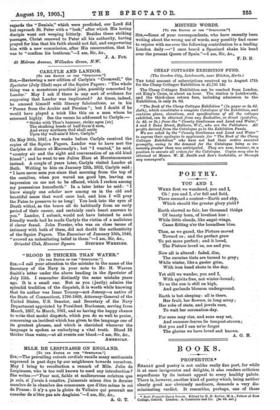CARLYLE AND LANDOR.
[To THE EDITOR OF THE "SPECTATOR."] SIR,—Reviewing a new edition of Carlyle's "Cromwell," the Spectator (July 22nd) says of the Squire Papers: "The whole thing was a monstrous practical joke, possibly concocted by
Landon" May I ask if there is any sort of evidence for supposing that Landor was implicated ? At times, indeed, he amused himself with literary fabrications, as in his "Poems from the Arabic and Persian " ; but I doubt if he would have played a trick like this on a man whom he esteemed highly. See the verses he addressed to Carlyle:—
• "Strike with Thor's hammer, strike agen [sic] The skulking heads of half-form'd men, And every northern God shall smile Upon thy well-aim'd blow, Carlyle."
On May 30th, 1847, a few weeks before Carlyle received the copies of the Squire Papers, Landor was to have met the Carlyles at dinner at Macready's ; but "I wanted," he said, "country air and the sight and conversation of an old kind friend" ; and he went to see Julius Hare at Hurstmonceaux instead. A couple of years later, Carlyle visited Landor at Bath. Writing to him on January 12th, 1852, Carlyle said : "I have never seen you since that morning from the top of the omnibus, when you waved me good bye, leaving an impression on me not to be effaced, which I reckon among my possessions henceforth." In a later letter he said : "I know simply one scholar now among us in the old and beautiful sense that word once had, and him I will pray
the Fates to preserve to us long ! You look into the eyes of Death withal, as the brave all do habitually from an early period of their career, and certainly one's heart answers to you." Landor, I submit, would not have listened to such friendly words had he made Carlyle the victim of a malicious if clever fraud. John Forster, who was on close terms of
intimacy with both of them, did not doubt the authenticity of the Squire Papers. The Examiner of January 1501, 1848, "avowed an unhesitating belief in them."—I am, Sir, &c., Oriental Club, Hanover Square. STEPHEN WHEELER.


































 Previous page
Previous page